Content
- Protecting the Environment and Society: The Importance of Meteorological and Hydrological Services in Latin America and the Caribbean
- Scientific Diplomacy in the Americas – Addressing Global Challenges
- COP28: Participation of Regional Delegates
- “Integrating Disciplines and Crossing Boundaries”: Interview with Mercy Borbor-Córdova
- El Niño in the Americas: Practical Knowledge to Protect Health and Promote Resilience
- Register for the free science communication launched by the IAI!
IAI Newsletter 4/23
Protecting the Environment and Society: The Importance of Meteorological and Hydrological Services in Latin America and the Caribbean
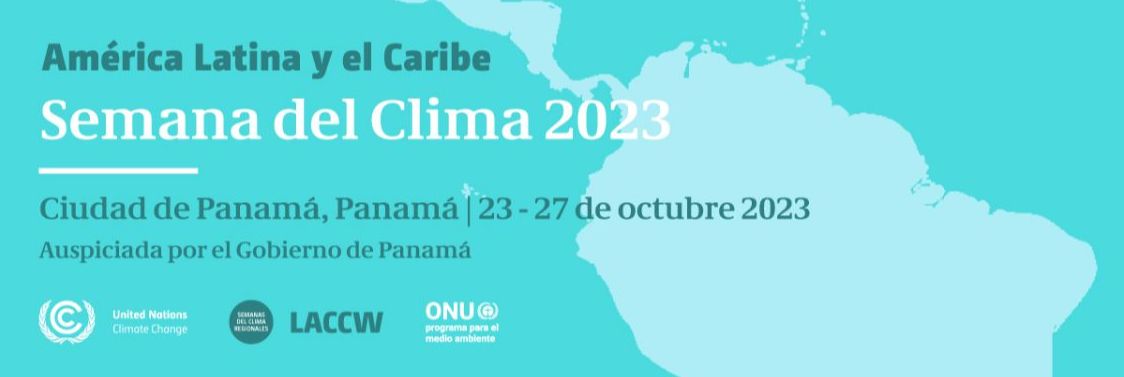
The Latin America and Caribbean Climate Week (LACCW 2023), organized by the UNFCCC (United Nations Framework Convention on Climate Change), took place from 23 October to 27, 2023, and was sponsored by the government of Panama. LACCW 2023, along with all Regional Climate Weeks, provides a platform for policymakers, professionals, businesses, and civil society to exchange climate solutions, discuss challenges, and highlight opportunities realized in different regions in preparation for COP28 in Dubai, United Arab Emirates.
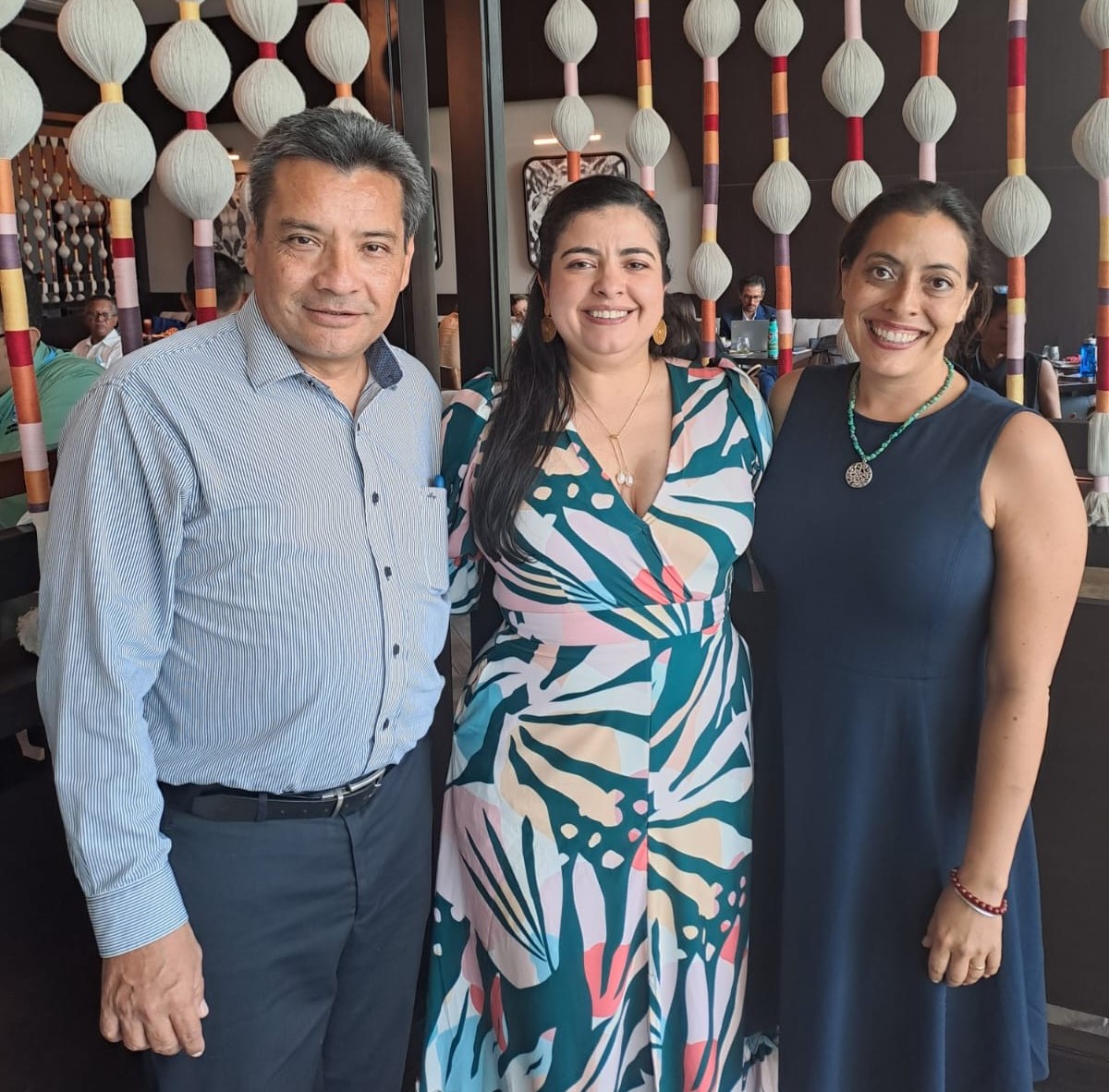 | 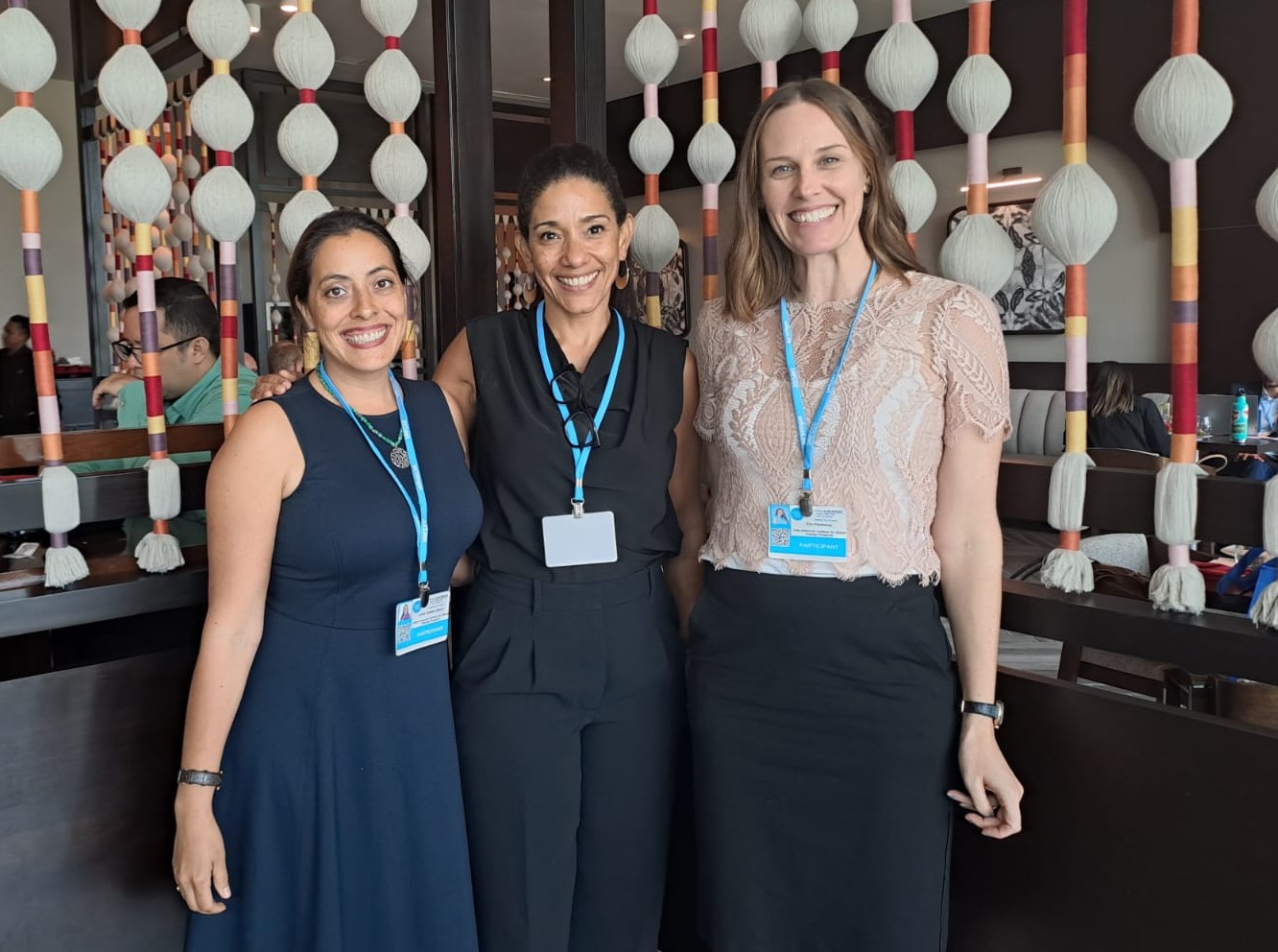 |
| Edwin Castellanos, Director of Science, IAI Ghisliane Echeverry, General Director of IDEAM Colombia Community Anna Stewart Ibarra, Executive Director, IAI | Anna Stewart Ibarra, Executive Director, IAI. Ana K. Spalding, of the Smithsonian Tropical Research Institute – Director – Adrienne Arsh Community Based Resilience Solutions Initiative Kim Portmess, IAI STeP Program Leader |
During LACCW 2023, key themes discussed throughout the week included preparations for the first Global Stocktake, Climate Financing, Adaptation, and building climate resilience, as well as the need to place communities at the center of climate action. Data and information gaps were also addressed as central elements for Just Transitions towards energy efficiency and for attracting climate-friendly investments.
“Finances do not exist in a vacuum but have a purpose. The impact of climate change is indiscriminate and affects everyone, everywhere, in everything… To manage the climate crisis, we must manage the debt system of countries.”. Mr. Hyginus ‘Gene’ Leon, President of the Caribbean Development Bank (CDB).
“It is important to work with stakeholders at the local level and maintain communication at all stages of the process. The top-down approach with governments promoting EWS must be complemented by a bottom-up approach to involve local stakeholders from the outset in the design of EWS.”Edwin Castellanos, Science Director, IAI.
The symposium in which IAI (Inter-American Institute for Global Change Research) participated on Meteorological and Hydrological Services in Latin America and the Caribbean in the provision of meteorological, hydrological, and climatic services, as well as early warnings for environmental and societal protection, was jointly organized with the WMO (World Meteorological Organization), UNEP (United Nations Environment Programme), and UNDRR (United Nations Office for Disaster Risk Reduction). The main objective was to highlight the crucial role of NMHS (National Meteorological and Hydrological Services) in regional environmental management and disaster risk reduction.
In addition, the Inter-American Institute for Global Change Research organized official parallel events and action sessions on the Center for Scientific Diplomacy, Innovations in Early Warning Systems (EWS), and discussions on Leadership.
“It is not enough to tell people that a catastrophe can happen if they do not have the tools to respond. This requires strengthening public health offices in prevention activities for the population.”. Daniel Buss, Head of the Climate Change Unit at PAHO.
IAI Newsletter 4/23
Scientific Diplomacy in the Americas – Addressing Global Challenges

From October 15 to 21, the inaugural training workshop, “Introduction to Scientific Diplomacy”, was held, organized by the Scientific Diplomacy Center (SDC) of the Inter-American Institute for Global Change Research and sponsored by the National Secretariat of Science, Technology and Innovation (SENACYT) of Panama. This workshop is part of the Scientific Diplomacy Training Program for Decision Makers in the Americas.
The event brought together participants from Latin America and the Caribbean in Panama City, providing a unique opportunity to learn and discuss how science diplomacy can address environmental and global challenges shared by the Americas.
“It is important that we work with organizations that lead the development of science and technology worldwide. These meetings stimulate debate, transmit experiences, and build positive bridges of rapprochement between our nations” . José Simpson Polo, Minister of the Presidency, Panamá
“We were able to move forward co-creatively and facilitate the transfer of knowledge and experiences that we all brought with us.”. Nicolás Trujillo, Scientific Diplomacy Program, Ministry of Science of Chile
“As citizens of the world, it is important to be able to learn and share good practices in multicultural exchange, in the exchange of knowledge, in scientific exchange, on how to communicate and how to establish relationships.”. Carlos Maynor Salinas, SENACYT, Panama.
The SDC training program aims to train government officials, scientific advisors, and experts from the Americas, especially in the Latin American and Caribbean (LAC) region, to support evidence-based policy processes at the national and multilateral levels. Additionally, the event seeks to provide a space to promote areas of shared interest and stimulate dialogue and collaboration between government officials, institutions, and countries, in order to address global challenges that affect the Americas.
Science diplomacy has become an essential component to address critical issues related to global environmental change in Latin America and the Caribbean (LAC), including biodiversity conservation, ecosystem services, and climate change. The Scientific Diplomacy Training Program seeks not only to equip decision-makers with the necessary tools and skills but also to catalyze areas of common interest and foster a collaborative approach to addressing these challenges.
The work agenda included a visit to the Coiba Scientific Station in the Coiba National Park, an exceptional natural laboratory and an outstanding example of scientific diplomacy in action. In addition, training sessions, panel discussions, and practical exercises were held to enable participants to gain a deeper understanding of science diplomacy and its applications.
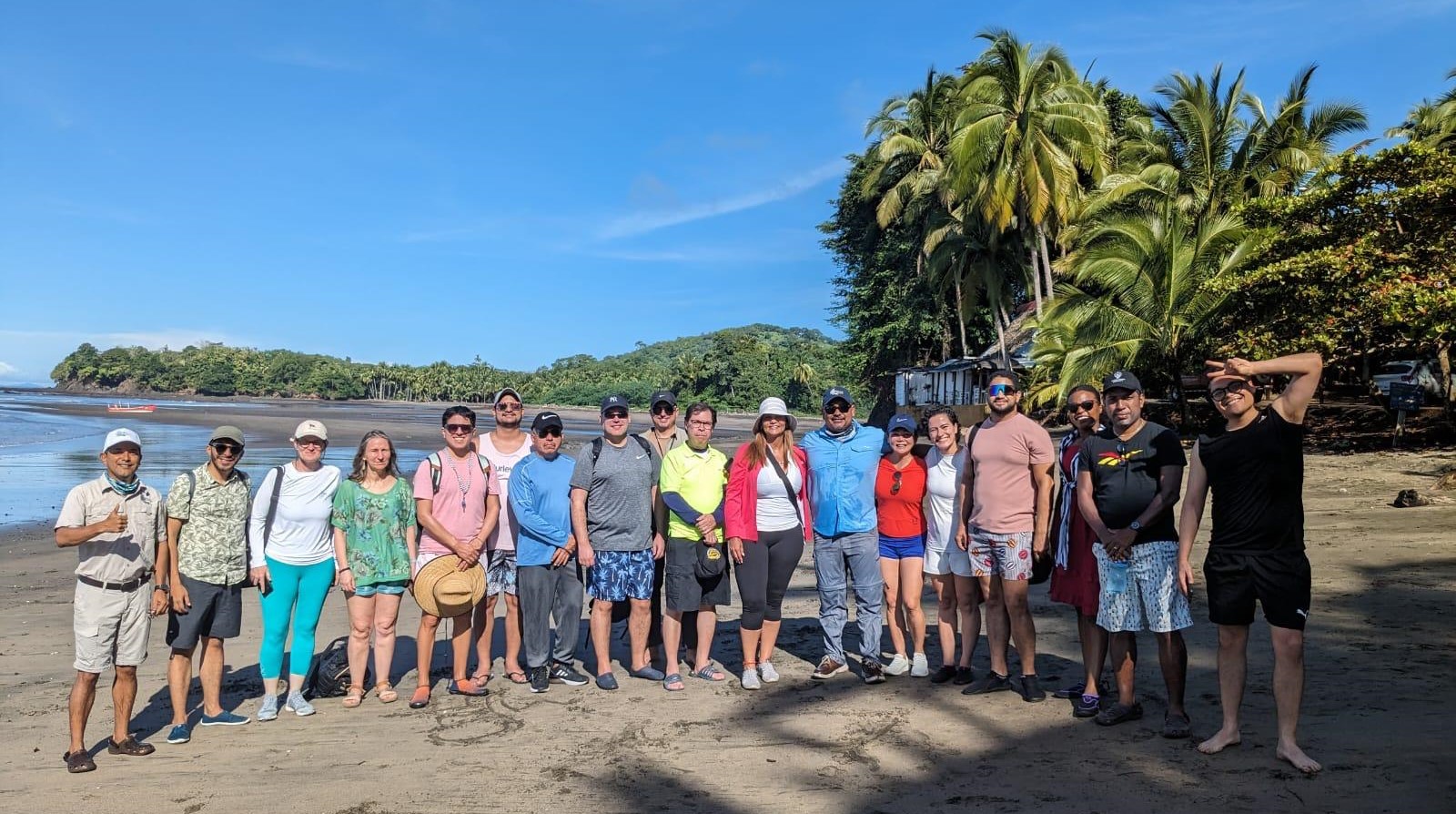
At the Science Diplomacy Forum, important topics were discussed, such as the role of science diplomacy in Panama and the Americas, national science diplomacy strategies, and science diplomacy in academia and the private sector.
 |  |
| Anabella Vásquez Fábrega, Director of International Cooperation, SENACYT. José Simpson Polo, Minister of the Presidency Marcella Ohira, Executive Vice Director, IAI | Reynaldo A. Lee V., Analyst of International Relations, SENACYT María Inés Carabajal, IAI STeP Fellow Anabella Vásquez Fábrega, Director of International Cooperation, SENACYT Anne-Teresa Birthwright, IAI STeP Fellow Marcella Ohira, Deputy Executive Director, IAI José Antonio Castillero, International Relations Analyst, SENACYT. |
The program concluded with a climate change negotiation simulation, where participants put what they learned into practice and demonstrated their ability to apply science diplomacy in real-world situations.
“We recognize that scientific diplomacy is a tool that contributes to closing gaps in science, technology, and innovation, building bridges with public policies to influence relations in the Americas”
For more information about the Center for Scientific Diplomacy and future programs, visit the IAI website at ********. a href=”https://iai.int/es/post/detail/SDC”>https://iai.int/en/post/detail/SDC *******
Participants:
- Maritza Jadrijevic Girardi, Ministry of the Environment, Chile
- Eneida Zanquetta de Freitas, Ministry of Science, Technology and Innovation (MCTI), Brazil
- German Daniel Quesada Paniagua, Department of Sustainable Development and Environment, Ministry of Foreign Affairs, Costa Rica
- Kenneth Rafael Marroquín López, Ministry of Foreign Affairs, Guatemala
- Norman Octavio Mendoza Domínguez, Ministry of Environment and Natural Resources, Guatemala
- Leonardo Pineda, Instituto de Hidrología, Meteorología y Estudios Ambientales – IDEAM, Colombia
- Antônio Marcos Mendonça, Ministry of Science, Technology and Innovation, Brazil
- Zunilda Medina, National Council of Science and Technology CONACYT, Paraguay
- Nicolas Trujillo, Scientific Diplomacy Program, Ministry of Sciences, Chile
- Matías Paolino, Ministry of Foreign Affairs, Uruguay
- Lilliam Casillas Martinez, Center for Inclusive Teaching and Learning, University of Puerto, Rico-Humacao, Puerto Rico
- Andrea Weilder de Albertini, National Council of Science and Technology CONACYT, Paraguay
- Marcos Oliveira, FAPESC, Brazil
- Anne-Teresa Birthwright, Inter-American Institute for Global Change Research, Jamaica
- María Inés Carabajal, Inter-American Institute for Global Change Research, Argentina
- Nathalia Diazibeth Tejedor Flores, Center for Multidisciplinary Studies in Sciences, Engineering and Technology (CEMCIT-AIP), Panama
- Luisa Morales, APANAC, Panama
- Maribel Pinto, Ministry of Environment, Panama
- Ediner Fuentes-Campos, SENACYT, Panama
- Carlos A. Alvarado Escala, Scientific Diplomacy of the International Cooperation Directorate, Ministry of Foreign Affairs, Panama
- Grimaldo Elías Ureña, Panama
- Denisse Loayza de Jaén, Renewables, Geosciences Engineering and Commercial, Engineering, Universidad Latina, Panama
- Carlos Maynor Salinas, SENACYT, Panama
- Juan Mate, Smithsonian Tropical Research Institute, Panama
- José Antonio Castillero Gálvez, SENACYT, Panama
- Reynaldo Lee Varela, SENACYT, Panama
- Mirella Martínez, FSU – Panama
- Angel Campos-González, Specialized Higher Technical Institute, Panama
- Genoveva Quintero, Ministry of Environment, Panama
- Jackeline Calderon, Ministry of Environment, Panama
- Aura López, CIEDU AIP Educational Research Center, Panama
- Katherine Martinez, Ministry of Environment, Panama
- Sara Solís, INDICATIC, Panama
- Grimaldo Elías Ureña, INDICATIC, Panama
- Luis Fernando Alvarado Gamboa, Ministry of Environment and Energy, Costa Rica
- Daniel Cabrera, Vice Ministry of Climate Change and Sustainability, Dominican Republic
- Gabriela Perezmella, Vice Ministry of Climate Change and Sustainability, Dominican Republic
- Lourdes Bntez de Gonzalez, Ministry of Foreign Affairs, Paraguay
- Fiorella Huapaya de Cancillería, Ministry of Foreign Affairs, Peru
- Roger Morales, Ministry of Environment, Peru
- Hilario Espinosa, Belmont Forum, Panama
- Gabriela Duarte, International Institute for Sustainability, Brazil
- Jessica Hidalgo, SENACYT, Panama
Instructors:
- José Simpson Polo, Minister of the Presidency, Panama
- Edwin Castellanos, Science Director, Inter-American Institute for Global Change Research
- Kimberly Montgomery, American Association for the Advancement of Science (AAAS), USA
- Carlos Eduardo Higa Matsumoto, Ministry of Science, Technology and Innovation, Brazil
- Carol Franco, Virginia Tech, Blacksburg, VA, USA
- Marga Gual Soler, Geneva Science and Diplomacy Anticipator (GESDA), Switzerland
- Alma Cristal Hernández-Mondragon, Center for Research and Advanced Studies, México
- Gabriela Gomes Coelho Ferreira, University of Sao Paulo, Brazil
- Franklin Carrero-Martinez, National Academies of Science, Engineering and Medicine (NASEM), USA
- Luisa F. Echeverría-King, Universidad Simón Bolívar in Barranquilla, Colombia
- Pedro Coss Sanz, Dominican Republic
- Kim Portmess, STeP Program Lead, Inter-American Institute for Global Change Research
- Marcella Ohira, Deputy Executive Director, Inter-American Institute for Global Change Research
- Omar Lopez, SENACYT, Panama
- Rolando Gittens, Institute of Scientific Research and Services of High Technology, (INDICASAT AIP)
- Panama Ivonne Torres, University of Panama, Panama
- Ligia Castro de Doens, MiAMBIENTE, Panama
- Yill Otero, Vice Minister of Foreign Affairs, Panama
- Luz Cumba Garcia, PhD, AAAS Fellow at USAID, USA/Puerto Rico
- Edgardo Díaz-Ferguson, Coiba Scientific Station (COIBA AIP), Panama
IAI Newsletter 4/23
COP28: Participation of Regional Delegates

The Inter-American Institute for Global Change Research (IAI) is sending a delegation to the 28th Conference of the Parties (COP28) of the UN Framework Convention on Climate Change (UNFCCC), which will be held in Abu Dhabi, United Arab Emirates, from November 30 to December 12, 2023. Members of the IAI Directorate will join members of IAI advisory committees to offer insights and contribute to the global dialogue on climate research and policy.
“Developing tools and capacities in science diplomacy is crucial to negotiations across Latin America and the Caribbean, to ensure that multilateral conventions like the UNFCCC can best respond to the needs and priorities of the countries.” Anna Stewart-Ibarra, IAI Executive Director.
IAI Directorate representatives include Anna Stewart-Ibarra, IAI Executive Director, an expert in climate and health within Latin America and the Caribbean, focusing on the socio-environmental drivers of vector-borne diseases and other aspects of human well-being; Marcella Ohira, Deputy Executive Director, with a background in designing capacity-building programs at the intersection of science, policy, and diplomacy; and Edwin Castellanos, Science Director, who specializes in climate change adaptation of rural and indigenous communities, deforestation and carbon emissions.
The IAI advisory committee members who will also be present at the COP28 meeting are Nathalie Flores, a specialist in international public policy with a focus on bridging sectors to combat climate change; Carol Franco Billini, who advises on nature-based solutions for food security and ecosystem services; Inés Camilloni, who works on regional and local climate change scenarios and potential impacts of climate engineering; and Alexander Turra, who specializes in marine ecology and governance.
IAI delegates have confirmed their participation in events at the Peru Pavilion, Ecuador Pavilion, Dominican Republic Pavilion, Central American Integration System (SICA) Pavilion and Ocean Pavilion.
You may download the IAI COP28 infosheet here: UNFCCC COP28 – EN.pdf
IAI Newsletter 4/23
Integrating Disciplines and Crossing Boundaries: Interview with Mercy Borbor-Córdova
.png)
Mercy Borbor-Córdova is a member of the **** IAI’s Scientific Advisory Committee ****. We caught up with her to learn more about her background in climate change research.
Dr. Borbor-Córdova is an oceanographer and holds a Ph.D. in Environmental Science from the State University of New York. She is a professor in the Faculty of Marine Engineering and Marine Sciences at the Escuela Superior Politécnica del Litoral (ESPOL) in Ecuador and has experience in the public sector. She was the Director of Environmental Control of the Municipality of Guayaquil and was Vice Minister of the Ministry of Environment of Ecuador.
She recently received the Graduate Distinction Award for Career Achievement for 2023 from the State University of New York’s College of Environmental Science and Forestry (SUNY ESF).
“On the path that I continue to travel, I try to work with young people and foster that confidence they need to have to be able to move forward and cross boundaries.”
What are you working on today related to climate change?
The topic of climate change is interdisciplinary in all lines of research, and at the moment I am working on two topics: the links of climate change (temperature and precipitation variables) in vector-borne diseases, and the link of rising temperatures and heat waves with human health.
What does your work in RESCLIMA consist of?
An important part of the work focuses on urban systems; we seek to determine the impacts of climate variables such as temperature and precipitation in intermediate cities. We see how climate, in terms of floods, in terms of heat waves, affects the population, especially from a city vulnerability perspective.
We are also studying the chain of impacts that flooding has on the proliferation of vectors and waterborne diseases. Everything has a joint incidence, which makes the health condition to be affected, especially in populations with greater vulnerability.
This knowledge should guide city planning, the location of vulnerable populations, and the management of informal settlements, among others.
What do you forecast for the most extreme regions of the Americas, for example, the Southern Cone, in the area of vector-borne diseases?
The distribution of temperature and precipitation is producing changes throughout South America. We have seen that in subtropical areas, due to the increase in temperature, it is more feasible to find vectors such as Aedes aegypti that were not there before.
With human mobility in the region, it also becomes very easy to carry viruses from one place to another. In countries such as Uruguay and Paraguay, there have been some major outbreaks never seen before.
It is important to do early epidemiological surveillance to know if there are places where habitats may be favorable for these vectors and to monitor people for the presence of viruses, and thus be able to establish the necessary measures to limit the spread.
“I have worked with the IAI for many, many years and I think the work it has done is fundamental. It has favored the integration of disciplines but also the professional development of researchers”.
Do you think it is possible to avoid a new epidemic of vector-borne diseases in tropical and subtropical regions? Do you think there is any early warning system that is functional?
It is possible to avoid a new epidemic but to do so, it is necessary to work in a coordinated and integrated manner. There is the possibility of establishing fairly accurate forecasts of the intensity and distribution of these diseases. If we had more precise surveillance, perhaps combined with active surveillance, for more local information, as well as work together with local ministries of health, we could have more successful interventions in vector-borne disease control. Our limitations are precisely the lack of coordination between the entities working in the territory. I believe a more integrated approach is necessary.
So what we need is better synchronization, interstate work, and also more international cooperation.
There are regions, such as the tropical regions, which have been very exposed, and from that, there are processes learned that could be shared, for adaptation to climate change in the health sector. If we also consider the health sector in a transversal way with climate systems, I believe we could integrate vulnerability information, and thus have a greater capacity for early reaction. This can be achieved by collaborating with international working groups to improve opportune knowledge.
What do you think are the specific ways in which you can work with decision-makers or with the affected populations themselves so that the most urgent actions can be carried out?
I think it is important that researchers have the capacity to deliver a clear, direct message on how this climatic and epidemiological information can be used for immediate and medium-term interventions. Because decision-makers want to see results in the short term I believe that we can work on these two levels.
I believe that the forecasts that are already being developed in different places can be a mechanism of great impact so that decision-makers can have more confidence, start working together and we can receive their feedback. Because sometimes the process evaluation of the interventions does not come out with all the results that we would like but that learning is what allows us to improve the interventions for the needs of the specific local context.
How do you work with the IAI or how do you value the work it does in the region?
I have worked with the IAI for many, many years and I think the work it has done is fundamental. I have seen it grow in the region; I myself am a product of the IAI that has accompanied me from my doctoral research until today. The institute has favored the integration of disciplines but also the professional development of researchers.
The different programs that the IAI maintains in the region, such as the STeP Fellowship program or the courses that have been given in Latin America, show the need to integrate scientific fields that were previously worked separately.
That crossover takes us out of our comfort zone and allows us to apply a systemic vision that really makes an impact, contributes to sustainable development goals, and articulates science and policy.
You have worked in the Galapagos Islands, which are a natural heritage of humanity and a biosphere reserve. What do you think is the main problem facing this ecosystem and how are the consequences of climate change reflected in it? What do you think is needed to mitigate the effect of climate change?
The Galapagos Islands archipelago of Ecuador is an ecosystem of great fragility and endemism, and its population is highly vulnerable to the impacts of climate change. This year we are working on the “Resilient Climate Development for Galapagos” project, which seeks to understand how sustainable development can be achieved by including the climate variable as a cross-cutting element in sectors such as agriculture, coastal and freshwater systems, and critical infrastructure.
We have talked with local actors and there is an agreement on the evidence of climate extremes and, although there are autonomous adaptation processes, they is a need for technical-scientific support towards more specialized management. These extreme changes will have an impact that will affect human health in one way or another. I think we need to work much more interdisciplinary and interdisciplinary, more practically and with local people.
“If we had more precise surveillance, perhaps combined with active surveillance, for more local information, as well as work together with local ministries of health, we could have more successful interventions in vector-borne disease control”.
You were awarded by the State University of New York for your professional achievements. What has been your most relevant contribution to the region?
It has really been a collaborative work with many people along the way. There has been a lot of receptivity and a lot of networking, which allows us to really make an impact. In the case of Upstate Medical University, I have done different research, but it is recognized that threats and dangers come in combination. That systemic view that we are using and that is also shared by the IAI, we have also reinforced it by working with State.
In my case, I would think that my greatest contribution has been to mainstream climate in the different sectors but also to include interdisciplinary and transdisciplinary systemic visions in the research. I think that’s a big learning.
What is the most important thing you have learned in your journey as a climate change researcher and expert? What would you say to those who are just starting their journey as researchers or who are starting a career focused on climate change?
On the one hand, it is important to be receptive and open-minded in order to incorporate new knowledge, new technologies, and new visions into your work. On the other hand, mentoring is fundamental. I had excellent mentors, such as Professor Charles Hall, who believed in me perhaps more than I myself could believe.
On the road that I continue to travel, I try to work with young people and build the confidence that they need to be able to move forward and cross boundaries.
Full interview: https://youtu.be/VdTtSNirnCg
IAI Newsletter 4/23
El Niño in the Americas: Practical Knowledge to Protect Health and Promote Resilience
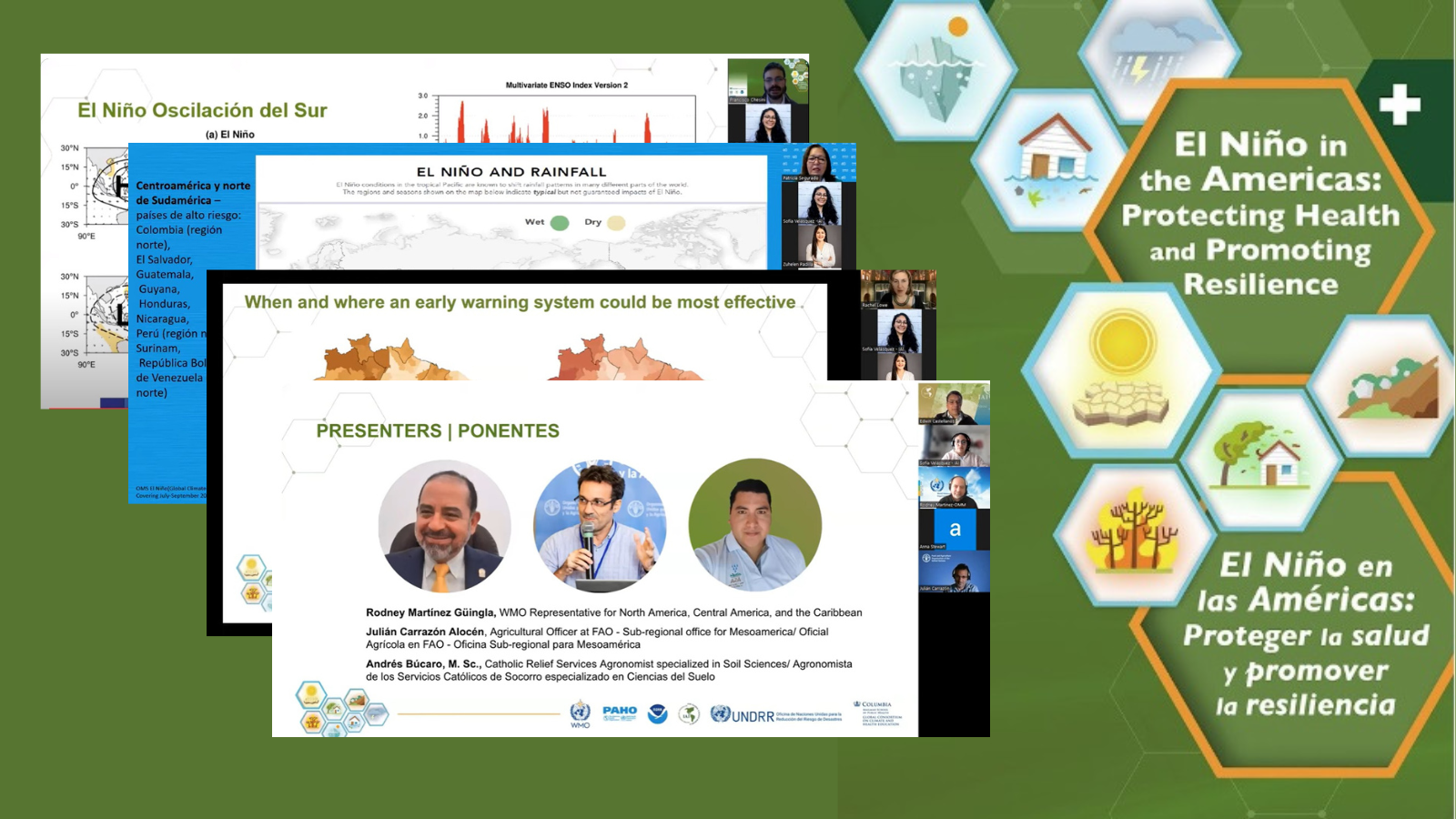
The recordings and presentations of the free course focused on the health response to the El Niño Southern Oscillation are now available on the Inter-American Research Institute for Global Change (IAI) website at no cost to users. The course was organized by the IAI, the World Meteorological Organization (WMO), the United Nations Office for Disaster Risk Reduction (UNDRR), the National Oceanic and Atmospheric Administration (NOAA), the Pan American Health Organization (PAHO) and the Global Consortium on Climate and Health Education (GCCHE).
More than 600 people participated in the online version of the course, from October 10 to October 26. The objective was to provide different public officials, planners, professionals, and any interested party, with the knowledge and tools necessary to prepare for local and regional impacts related to health and climate in the face of a new cycle of the El Niño phenomenon in the region.
You may view the materials for the following sessions:
– Introductory session focusing on El Niño and the reduction of its impacts on the health sector: Forecast, best practices and recommendations, where speakers provided information on tools for decision makers and technical teams, shared experiences and cases of good practices in health prevention. Speakers included Anna Stewart-Ibarra, Executive Director of IAI, Andrés Orias, Programs Officer of the Regional Office for the Americas at WMO, Daniel Buss, Head of the Climate Change and Environmental Determinants of Health Unit at PAHO, José Gálvez, from the National Oceanic and Atmospheric Administration (NOAA), Paulo Ortíz from the Cuban Meteorological Institute, Laura Lee Boodram from the Caribbean Public Health Agency (CARPHA), Francisco Chesini from the Ministry of Health of Argentina, Nahuel Arenas, Head of the Regional Office for the Americas and the Caribbean at UNDRR, and Cecilia Sorensen, Director of the Global Consortium on Climate and Health Education.
– Session 1, which dealt with the topic of Drought and Nutrition, featured the participation of Rodney Martínez, WMO representative for North America, Central America and the Caribbean, who delved into the El Niño phenomenon and recommendations for dealing with it, Julián Carrazón Alocén, agriculture officer for the FAO Subregional Office for Mesoamerica, who specialized his talk on El Niño and its effects on agriculture and with Andrés Búcaro, president of the board of directors of the Guatemalan Association of Soil Sciences who presented on water, the soil and El Niño and how to revitalize small-scale dryland agriculture.
– Session 2 on Extreme Temperatures was carried out by Francisco Chesini, technical representative of the “National Program for the Reduction of Health Risks Associated with Climate Change” of the Ministry of Health of Argentina, who delved into Climate Change and heat waves, and Tania Ita, a meteorological research specialist at the National Meteorology and Hydrology Service of Peru who presented a case study on heat waves and human health in Peru.
– Session 3, which dealt with the topic of Water Quality, featured Patricia Rodezno, PAHO Health and Environment advisor, who spoke about the quality and safety of water and its relationship with El Niño, and Salvador Ayala, Geographer and master’s degree and doctor. in Public Health from the University of Chile who presented initiatives for the adaptation of the health sector to the climate, with an example from Chile.

– Session 4 on Disasters was carried out by José Marengo, general coordinator of Research and Development of CEMADEN, who delved into the ENSO (El Niño Southern Oscillation) and its influence on disaster risk, and Carolina Portaluppi, UNDP consultant, who spoke about the creation of community situation rooms, focusing on Ecuador.
– Session 5, which dealt with Zoonotic and Vector-Borne Diseases, featured Rachel Lowe, ICREA Research Professor and Global Health Resilience Team Leader at the BSC, who delved into zoonotic and vector-borne diseases, and Ángel Muñoz, senior researcher at the BSC, who spoke about a new system for monitoring and predicting diseases transmitted by Aede.
– The last session on Air Quality was given by Juan José Castro, regional advisor on air quality and health at PAHO, who spoke about air pollution and health, and William Checkley, professor of medicine at Johns Hopkins University, who conducted a presentation on the effects of climate variability on health with a practical case from Peru.
You may download the presentations and view the recordings
IAI Newsletter 4/23
Register for the free science communication launched by the IAI!

Trust in scientific information has declined in the general public due to the recent growth of unreliable alternative methods of communication and the politicization of specialized knowledge, among other reasons.
In addition, the general public and decision-makers have difficulties understanding specialized information, therefore, improving the ability to communicate scientific results to different social actors.
The free course “Science Communication and How to Explain Science to the General Public” is now available to the community of the Inter-American Institute for Global Change Research (IAI). It is a self-managed course, aimed at developing techniques for an effective communication with different audiences and to disseminate knowledge so that informed public policy decisions are made.
The course consists of 5 modules that can be completed independently. The sessions are led by international experts, and users can obtain a certificate awarded by the IAI, PAHO, and GCCHE if they score 70% or more in the final evaluation.
At the end of the course, the participant is expected to:
- Select information with journalistic relevance
- Use writing techniques to reach a wide audience
- Represent data in a manner interesting for readers
- Summarize concepts for adequate dissemination
- Propose actions with sufficient clarity
Inscríbase ahora en https://moodle.iai.int/





